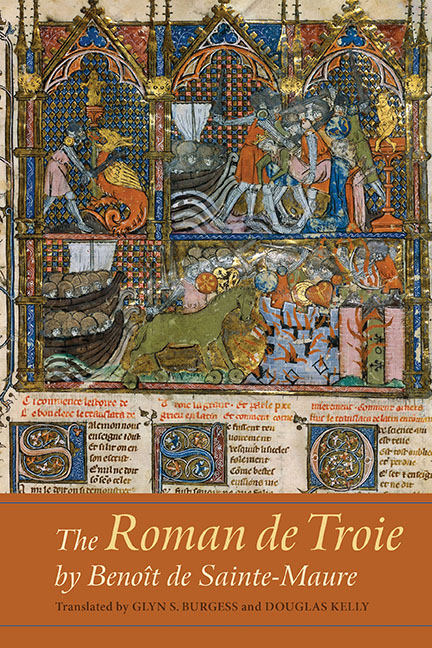Book contents
- Frontmatter
- Contents
- Dedication
- Preface and Acknowledgements
- Introduction
- A Note on the Translation
- Outline of the Roman de Troie
- The Roman De Troie
- Part One Causes and Effects
- Part Two The Trojan War
- Part Three Settling Scores and Surviving
- Appendix I Notes on Some Common Words in the Roman de Troie
- Appendix II Manuscripts of the Roman de Troie
- Bibliography
- Indexes of Personal and Geographical Names
- Index of Personal Names
- Index of Geographical Names
- Miscellaneous Endmatter
Introduction
Published online by Cambridge University Press: 15 February 2018
- Frontmatter
- Contents
- Dedication
- Preface and Acknowledgements
- Introduction
- A Note on the Translation
- Outline of the Roman de Troie
- The Roman De Troie
- Part One Causes and Effects
- Part Two The Trojan War
- Part Three Settling Scores and Surviving
- Appendix I Notes on Some Common Words in the Roman de Troie
- Appendix II Manuscripts of the Roman de Troie
- Bibliography
- Indexes of Personal and Geographical Names
- Index of Personal Names
- Index of Geographical Names
- Miscellaneous Endmatter
Summary
Since antiquity, war has been the subject of a wide-ranging sub-genre of narrative poetry or historical fiction, from Homer's epics and the Bhagavad Gita, Statius's Thebaid and Vergil's Aeneid, to modern novels and war poetry such as Lynette Roberts's poem ‘Gods with Stainless Ears’, from which the second epigraph to this volume is taken. Yet all these works treat the same phenomenon: the fortunes of the warriors and others who experience whatever in war is at stake. The men who shine darkly are warriors whose epic heroism reveals a darkness that the trauma of war allows to extend throughout the narrative, much as darkness does each day on the battlefield in the Troie. A more ‘visible’ depiction of war's atrocities and traumas is literally available today in Ken Burns's documentary, The Civil War, and, of course, in newspaper accounts and photographs of war, in sites and climes that are not that far removed from the presumed battlefields of historic Troy in Turkey. In war, as in other walks of life, plus ça change, plus c'est la même chose. Benoît's Roman de Troie depicts war, with its causes and effects, over a period of ten years and more of animosity and hostility between Greeks and Trojans. It can claim originality in the way it brought to its twelfth-century vernacular audiences a subject that was less well known to them than it was to those who had received a Latin education.
The Medieval Reception of the Troie
The Roman de Troie is a medieval masterpiece that was greatly admired by the public at which it was aimed. We therefore begin our exploration of the medieval reception of the Troie in the Middle Ages by assessing the number of extant manuscripts. Five names survive as twelfth-century French authors whose narrative poetry remains prominent in our own time: Thomas d'Angleterre, Marie de France, Chrétien de Troyes, Wace and, last but not least, Benoît de Sainte-Maure. However, not all the narrative poetry of these authors enjoys the prominence and attention that it enjoyed in their own time. If we compare the number of surviving manuscripts of these authors’ works and the frequency of medieval translations and adaptations of them in their own and other languages, striking differences in taste are evident.
- Type
- Chapter
- Information
- The Roman de Troie by Benoît de Sainte-MaureA Translation, pp. 1 - 32Publisher: Boydell & BrewerPrint publication year: 2017

